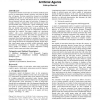Free Online Productivity Tools
i2Speak
i2Symbol
i2OCR
iTex2Img
iWeb2Print
iWeb2Shot
i2Type
iPdf2Split
iPdf2Merge
i2Bopomofo
i2Arabic
i2Style
i2Image
i2PDF
iLatex2Rtf
Sci2ools
109
click to vote
ATAL
2011
Springer
2011
Springer
A computational model of achievement motivation for artificial agents
Computational models of motivation are tools that artificial agents can use to autonomously identify, prioritize, and select the goals they will pursue. Previous research has focused on developing computational models of arousal-based theories of motivation, including novelty, curiosity and interest. However, arousal-based theories represent only one aspect of motivation. In humans, for example, curiosity is tempered by other motivations such as the need for health, safety, competence, a sense of belonging, esteem from others or influence over others. To create artificial agents that can identify and prioritize their goals according to this broader range of needs, new kinds of computational models of motivation are required. This paper expands our ‘motivation toolbox’ with a new computational model of achievement motivation for artificial agents. The model uses sigmoid curves to model approach of success and avoidance of failure. An experiment from human psychology is simulated to...
Related Content
| Added | 12 Dec 2011 |
| Updated | 12 Dec 2011 |
| Type | Journal |
| Year | 2011 |
| Where | ATAL |
| Authors | Kathryn Elizabeth Merrick |
Comments (0)

